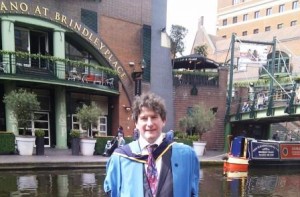I’ve sadly under-nourished this blog over the past few weeks for a couple of good reasons and one that’s, unfortunately, not so satisfying.
The first good reason is that I’m trying to get the novel manuscript revised after Emma Sweeney’s feedback (the two solid weeks mentioned in previous posts) and I’ve decided to ask her to look over the first three chapters of the novel in more detail as these are what it will initially be assessed on by agents.
Incidentally I was invited by Emma on Thursday to the Literary Club at New York University in London, where she teaches, and I met the novelist Edward Hogan who was giving a reading. I had a short chat with him and he’s really nice chap. Several people have recommended his novels Blackmoor and The Hunger Trace and the reading he gave us from the latter was very compelling.
The second reason for lack of blog updates is fitting in lots of commitments in general life. As well as the evening at NYU in London, we had a rare evening workshop with the ex-City stalwarts on Tuesday and there have been some gripping, if disappointing, Premier League matches that haven’t escaped my attention.
But Saturday was something of a ceremonial milestone as I went to up to Birmingham,

where I spent three years as an undergraduate, for my Open University MSc degree ceremony at the Symphony Hall.
(As a strange co-incidence, the redeveloped canals of city-centre Birmingham — one of which I’m posing next to — play a part in my MA course-mate Kerry’s novel-in-progress.)
It’s been over a year since I finished the MSc (see this post about when I got the hard copies back) and I could have gone to earlier graduation ceremonies but I wanted one at a weekend and I thought it quite appropriate to return to the scene of my undergraduate dissolution. The Birmingham Symphony Hall was an impressive venue — preferable imho to the OU’s London location for graduation — the Barbican (where I was presented with my MBA from Kingston University) — described as a ‘concrete bunker’ by someone I work with who had a choice of Barbican or Brighton Pavilion for his OU graduation.
I’m such an OU advocate that I went back to look at the website to see if there were any courses I could do that might advance some of the interests I’ve picked up in the long process of researching this novel — art being an obvious choice but also architecture and psychology.
I had a shock when I saw the cost of a 60 point humanities course had shot up to £2,500. I had a look at the prices for the Creative Writing and Advanced Creative Writing courses — and both were also the same price. When I first enrolled for Creative Writing back in 2007 I’m sure the cost was more like £600.
Perhaps the government has cut the OU’s funding — but the OU may also feel it can justify charging more because 360 points earns a student a bachelor’s degree — so £15,000 at current prices which is far less than the £27,000 or so students will have to pay at most conventional universities.
This means anyone taking the same creative writing courses as those I did will need to shell out £5k nowadays — which, I suppose, makes me appreciate more the amount and quality of creative writing teaching that I’ve been taking almost continuously for the last five years — and this in turn makes me think that I need to push myself to try and get a return on all this investment (hence less time spent blogging recently and more writing the novel). And perhaps mercifully for my leisure time the OU’s new fees deter me from casually signing up to a new Arts course on the basis that it looks interesting.
It’s very easy for an aspiring writer to spend a lot of money in the quest to become published and I wonder if more money is now made by people charging for courses, manuscript appraisals, consultancy, conferences and so on than is made by writers in the act of writing itself (if you take the likes of J.K.Rowling out of the calculation). It seems that plenty of excellent published writers supplement their scandalously meagre income from writing in this way.
However, this might not be such an odd model for the future — it’s how activities like sport, art or cookery are organised — with a few star professionals whom the masses aspire to emulate. Even though they know they’ll never be Wayne Rooney or Damien Hirst or Jamie Oliver, millions are happy to practice in their own leisure time and pay others for tuition. If writing hasn’t already adopted this model it might be because of the high fixed costs of publishing — but now with cheap access to e-publishing and print on demand — then there are fewer barriers to much wider, paying participation as with sport.
But back to the graduation ceremony. One thing that struck me was the demographic composition of my fellow graduates. Probably two thirds of those being ceremonially conferred with a degree were women — and women of all ages. The men were skewed much more towards the older age group — I was told that I was one of the few who didn’t have grey hair (not enough to notice on a stage anyway). This might not have been surprising for postgraduates but the undergraduates outnumbered us by about 8 to 1.
This ties in with evidence, such as that cited in The Economist’s Megachange book that I was given to read, that women already outnumber men overall in the tertiary education sector. If, as we’re told by forecasters like The Economist, that the future of work will depend much more on the sort of intelligence and innovation that comes from a higher level of education then the larger proportion of women than men! who seem to put in the sort of time commitment and motivation that an OU degree requires, ought to manifest some profound changes in the workplace.
I travelled up to Birmingham on the train and, as if to re-inforce the point, there was a large party of Scottish twenty-something men in my carriage. At 9am they were swilling Rab C Nesbitt’s favourite tipple — Buckfast — straight from the bottle and washing it down with cans of Red Stripe. Like most people I guess I have a fairly hypocritical attitude to public drinking if it’s not me that’s doing it — if I’m sober and I smell beer on someone’s breath on the tube I think ‘alky’ — even though I must often be that beery-breathed person myself. Â So I was pretty appalled by this bunch even though they were (at that time in the morning) fairly good natured. Presumably they were on some weekend bender of which I was glad to have only to witnessed the beginning.
Nevertheless, while extreme, this seemed to sum up the contrast between feckless under-40 males and their more diligent and industrious female counterparts. At the risk of making sweeping gender stereotyping generalisations, the fact that, on average, men manage to hold their own in the workplace against better qualified women seems to me to be another instance of the ‘bias towards bullshit’ in British corporate culture.
This prejudice leaped out of one of Lord Sugar’s comments in the latest Apprentice — where he reasoned that Azhar ought to be fired partly because his sensible points and good ideas were ignored by other the more loud-mouthed and egotistical contestants — and that telling idiots who are too self-absorbed to listen that they are wrong is somehow ‘too negative’.
This is a theme, possibly unintentionally, of my novel — with two contrasting but highly educated and highly motivated female characters. Both Kim and Emma have Master’s degrees and are ascending to the top of their professions (albeit in ways that might not seem obvious at the time). James also has an MBA but he’s disaffected and marginalised by working life and the novel starts with him wanting to get out but drifting rather than than being driven to achieve his ambitions.
The MSc in Software Development is something of a clue that my ‘day job’ is something to do with IT, which is thought of as a fairly male-dominated industry. However, I tend to have always worked quite closely with women. My first job was as a graduate trainee at British Airways and I had a female on-the-job tutor and I’ve worked very closely with many women — for a long time in my last job I was the only male in a team of three who travelled abroad a lot together (mainly to Germany — hence the background to the novel) and I ended up for a time sitting next to the two PAs who worked for a FTSE 100 company’s UK IT director — which provided quite a few fascinating insights. (No surprise there’s also a PA in the novel.)
I’ve consequently found it odd to be working recently (the third reason for under-nourishing the blog is having to spend lots of time commuting for this job) in a team of people who are 100% male — the office environment and projects I mostly work on are fortunately quite mixed but the team meetings have been quite strange affairs. Today there was a discussion in blokily knowledgeable detail about how the missiles planned to be stationed in London for the Olympics would be used to shoot down any errant airliners. It’s as if it’s unsaid but everyone realises there’s something indefinable that’s missing –I’m sure there’s a similar sort of dynamic in all-women teams too in professions where women are dominant (apparently publishing is meant to be one).
Ironically, if someone said ‘what we need on this team is a few women’ then it would get exactly the sort of ribald, guffawing, nudge-nudge response that would prove the point. And I suppose a lot of the novel is about this subject too — the interactions between working men and women provide much of the novel’s momentum.
[NB. Post has been cleaned up after up the mess of trying to edit a blog on an iPad using Safari on a 3G connection on a train.]

